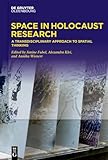Space in Holocaust Research : A Transdisciplinary Approach to Spatial Thinking / ed. by Janine Fubel, Alexandra Klei, Annika Wienert.
Material type: TextPublisher: Mnchen ; Wien : De Gruyter Oldenbourg, [2024]Copyright date: 2024Description: 1 online resource (VII, 355 p.)Content type:
TextPublisher: Mnchen ; Wien : De Gruyter Oldenbourg, [2024]Copyright date: 2024Description: 1 online resource (VII, 355 p.)Content type: - 9783111078144
- 9783111078946
- 9783111078816
- History -- Research
- History -- Research
- Holocaust, Jewish (1939-1945) -- Research
- Holocaust, Jewish (1939-1945) -- Research
- Holocaust, Jewish (1939-1945)
- Spatial history
- Spatial history
- Judenvernichtung
- Kollektives Gedächtnis
- Nationalsozialismus
- Raum
- HISTORY / Holocaust
- Memory
- Shoah, National Socialism
- space
- 940.53/18072 23/eng/20240607
- D804.33 .S63 2024
- online - DeGruyter
- Issued also in print.
| Item type | Current library | Call number | URL | Status | Notes | Barcode | |
|---|---|---|---|---|---|---|---|
 eBook
eBook
|
Biblioteca "Angelicum" Pont. Univ. S.Tommaso d'Aquino Nuvola online | online - DeGruyter (Browse shelf(Opens below)) | Online access | Not for loan (Accesso limitato) | Accesso per gli utenti autorizzati / Access for authorized users | (dgr)9783111078816 |
Frontmatter -- Contents -- Tracing Oblivion: The Collected Works of Yael Atzmony -- Tracing Oblivion -- Spatial Thinking in Holocaust Studies -- Part I: Theoretical-methodological Approaches -- Expanding Geographies of the Holocaust: Refugees and Spatial Histories -- Space and Violence as Analytical Categories in Holocaust Research -- Why is Landscape Research Important for Holocaust Studies? -- How Can We Map the Holocaust? -- Daily Experiences of Persecution in the City: Mobilizing Diaries to Study the Holocaust in Urban Settings -- Space in Holocaust Film -- Part II: Case Studies -- Fleeting Spaces -- Motion, Fluidity, and Virtuality of Space -- Multipurposing Jewish Spaces: German Jewry’s Struggles to Provide Places for its Activities in Hostile Surroundings -- Remembering Arcadia in Auschwitz: Pastoral Representations of the Death Camps -- Domestic Space in the Films of Chantal Akerman and Claude Lanzmann -- Institutionalized Spaces -- Institutionalization as a Socio-spatial Process: Norms, Rules, and Behavior -- Blocked Pathways: Regional Room for Manoeuvre of the Jews in the Administrative District of Zichenau, 1939–1945 -- Denkmäler als Raumproduzenten – Der Gedenkkomplex Trascjanec bei Minsk -- Border/ing Spaces -- Drawing Lines, Crossing Frontiers, Transgressing Boundaries -- Treblinka Geography: Nazi Building, Jewish Breaking, Historical Reconstructing -- Fensterblicke auf den Genozid -- Spatial Relations -- Overlapping, Overwriting: Syn/Diachronic Spatial Relationships -- Wandlungen eines Exil- und Erinnerungsraumes: Shanghai – Hongkou – Tilanqiao -- Räumliche Überlagerungen. Erkenntnisse zu den Raumbeziehungen der Mahn- und Gedenkstätte Ravensbrück durch eine zeichnerisch-räumliche Analyse -- List of Contributors
restricted access online access with authorization star
http://purl.org/coar/access_right/c_16ec
In recent years, the issue of space has sparked debates in the field of Holocaust Studies. The book demonstrates the transdisciplinary potential of space-related approaches. The editors suggest that “spatial thinking” can foster a dialogue on the history, aftermath, and memory of the Holocaust that transcends disciplinary boundaries. Artworks by Yael Atzmony serve as a prologue to the volume, inviting us to reflect on the complicated relation of the actual crime site of the Sobibor extermination camp to (family) memory, archival sources, and material traces. In the first part of the book, renowned scholars introduce readers to the relevance of space for key aspects of Holocaust Studies. In the second part, nine original case studies demonstrate how and to what ends spatial thinking in Holocaust research can be put into practice. In four introductory essays, the editors identify spatial configurations that transcend conventional disciplinary, chronological, or geographical systematizations: Fleeting Spaces; Institutionalized Spaces; Border/ing Spaces; Spatial Relations. Drawing on a host of theoretical concepts and addressing various historical contexts as well as different types of media, this book offers scholars and students valuable insights into cutting-edge, international scholarly debates.
Issued also in print.
funded by Fondation pour la Mémoire de la Shoah
Mode of access: Internet via World Wide Web.
In English.
Description based on online resource; title from PDF title page (publisher's Web site, viewed 20. Nov 2024)


